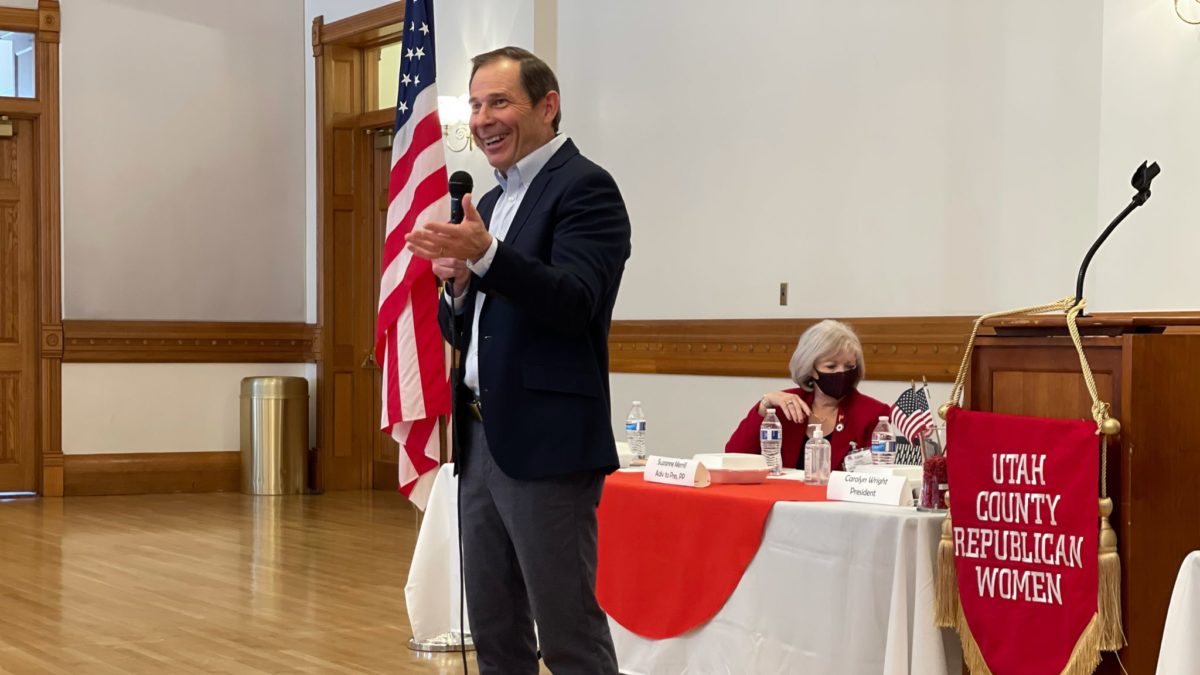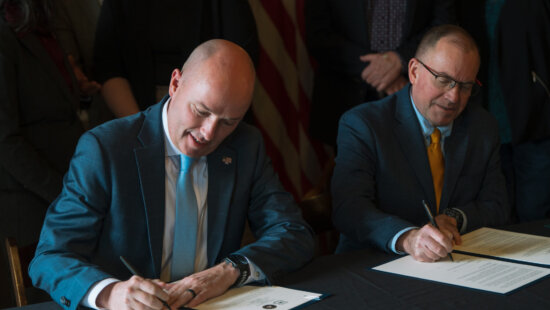Politics
Curtis’ bill to repeal BLM public land policy gets green light from House

Photo: Rep. John Curtis
The WEST Act is one of four land management and natural resources bills passed on Tuesday
By: Kyle Dunphey and Jacob Fischler, Utah News Dispatch
Utah Republican Rep. John Curtis’ bill to repeal a controversial new public lands policy is gaining traction after passing out of the U.S. House of Representatives on Tuesday.
The WEST Act — short for Western Economic Security Today — would direct the Bureau of Land Management to withdraw its “Public Lands Rule” that was recently finalized.
The law passed the House after a 212-202 vote. Three Democrat representatives joined Republicans in voting for the bill — Henry Cuellar of Texas, Jared Golden of Maine and Marie Gluesenkamp Perez of Washington. Pennsylvania Rep. Brian Fitzpatrick was the lone Republican “no” vote.
The BLM rule would allow for conservation leases, similar to how the agency leases land for mineral extraction, energy development, recreation or grazing. It would create restoration leases for groups or individuals to improve habitats and restore or conserve land — and mitigation leases, to offset existing development and projects on BLM land.
It was celebrated by environmental groups, but Curtis and other Utah Republicans argue the rule would allow groups to permanently hold land while negatively impacting traditional uses like grazing or commercial guiding.
“The rule the BLM recently finalized undermines the very people who rely on our federal lands for ranching, grazing, recreation, and beyond. Utahns know the true value of these lands and they should remain open to everyone. Instead, this rule favors wealthy individuals and environmental groups, allowing them to lock up land that belongs to all Utahns,” Curtis said in a statement Tuesday after the bill passed.
Curtis framed the rule as another example of Washington D.C. forcing rural Utah to comply with unpopular policy. Most of the state — about 65% — is government land controlled by federal agencies, which Curtis said makes it difficult for local politicians to manage their towns and districts.
“The question isn’t whether or not we want to protect these lands, but who gets to make the decisions?” he said on the House floor. “It is critical that Utah’s lands remain under the stewardship of those who have tended it for generations. There’s a lot of hyperbole in Washington, and I’m genuine when I say this is one of the most offensive attacks on rural Utah I have seen in my career.”
Curtis’ bill was heavily criticized by environmental groups, including the Southern Utah Wilderness Alliance, which was one of 115 organizations that signed a letter urging lawmakers to vote “no.”
In a statement, the organization’s Washington D.C. director Travis Hammill called the Public Lands Rule “overdue” and accused Curtis, who is vying for outgoing GOP Sen. Mitt Romney’s seat, of campaigning.
“The WEST Act is nothing more than election-year grandstanding and has no chance of becoming law,” said Hammill. “Representative Curtis’s decision to sponsor the WEST Act is at odds with the majority of Utahns who support conservation and know climate change is a serious problem.”
Michael Carroll, the BLM Campaign Director for The Wilderness Society, described the law as a handout to extractive industries.
“Today Congressman Curtis and his anti-public lands partners in the House showed who they really represent: Big Agri-biz, mining and multinational oil companies who want to profit at the expense of our public lands,” Carroll said in a statement. “People across the West and around the country support the balance between conservation and extraction the Public Lands Rule creates. Sadly, Curtis and his allies want to keep the scales weighted in the favor of the old, dirty extraction industries.”
One of Curtis’ main gripes with the bill is that the BLM didn’t consult communities in rural Utah. On Wednesday, Curtis grilled U.S. Department of the Interior Secretary Deb Haaland, who testified before the House Committee on Natural Resources.
“We got no listening sessions in Utah, can you tell me why you weren’t willing to do that?” Curtis asked.
“It was a very transparent process, where whoever wanted to comment publicly was able to do so, and I feel very confident that the staff we have in Utah is very close with the local community there,” Haaland told Curtis. “I feel confident that those local communities have complete access to the BLM staff.”
House passes three other natural resource and land management bills
In addition to Curtis’ bill, the House approved three other bills focused on natural resources and land management Tuesday, promoting a Republican message of dissatisfaction with the Biden administration’s approach to conservation.
The bills would remove mining restrictions near Minnesota’s Boundary Waters, delist the gray wolf from the Endangered Species Act and block federal bans on lead ammunition.
The bills passed with few members of each party crossing the aisle.
They are unlikely to become law — or even receive a vote in the Democrat-controlled U.S. Senate — but their passage is an election-year message that Republicans support extractive industries in rural communities and oppose what they describe as an overreaching environmental agenda.
“Whether it’s the new BLM rule that fundamentally threatens the western way of life, or the decision to lock up enormous deposits of increasingly scarce minerals, it’s clear Biden and his bureaucrats have no interest in properly stewarding our federal lands or listening to local stakeholders,” House Natural Resources Chairman Bruce Westerman, an Arkansas Republican, said in a statement following the votes.
Democrats blasted the bills, saying they were ideological rather than practical.
“The entire House schedule this week misses the mark,” California Democrat Jared Huffman said. “It elevates right-wing ideology over the actual needs of the American people.”
Huffman managed Democratic speakers during much of Tuesday’s floor debate in place of House Natural Resources ranking Democrat Raúl Grijalva of Arizona, who announced a cancer diagnosis last month.
Biden has signaled strong opposition to the bills.
Gray wolf
The House voted 209-205 to pass a bill authored by Colorado Republican Lauren Boebert that would remove the gray wolf from the federal endangered species list.
Republicans Fitzpatrick, Matt Gaetz of Florida, Mike Garcia of California and Nancy Mace of South Carolina voted against the bill. Democrats Yadira Caraveo of Colorado, Cuellar, Golden and Perez voted in favor.
Under the bill, states would be empowered to manage wolf populations, Boebert said on the House floor.
During floor debate, Republicans said wolves have fully recovered and no longer needed federal protections. They also said the predators were a nuisance to livestock and the ranchers whose livelihoods depend on cattle and sheep.
“I stand here today celebrating the success story of the Endangered Species Act, seeing that the gray wolf has been fully recovered,” Boebert said. “I also stand today … in defense of our farmers and our ranchers.”
Democrats argued that while gray wolves’ numbers have increased, they are still in danger of extinction if federal protections were to disappear.
Virginia Democrat Don Beyer noted that states such as Montana, Wyoming and Idaho that have delisted wolves saw overhunting.
“We’re in the midst of a biodiversity crisis,” Beyer said. “We should be supporting current scientific efforts by fully funding the agencies that carry out ESA extinction preservation work.”
Beyer also took a veiled shot at South Dakota Gov. Kristi Noem, a Republican who described in a recently published memoir killing her 14-month-old hunting dog in a gravel pit.
Dogs kill twice as many cattle as wolves, Beyer said.
“Yet we don’t say that all good dogs should go to the gravel pit,” he said.
Lead bullets
The House also passed, 214-201, a bill sponsored by Virginia Republican Rob Wittman to block the Department of Agriculture and Department of Interior from regulating the use of lead ammunition or lead fishing equipment on federal lands or waters.
Republicans Fitzpatrick, Gatez and Vern Buchanan of Florida voted against it.
Democrats Cuellar, Donald Davis of North Carolina, Robert Garcia of California, Golden, Vicente Gonzalez of Texas, Mary Peltola of Alaska and Perez voted in favor.
Each side accused the other of indulging special interests on the issue.
Democrats said Republicans were more concerned about blocking regulations on guns than promoting hunting and fishing.
“When it comes to guns, and now ammo, any type of restriction is too much for Republican ideology,” Huffman said.
Westerman said the bill “probably is more aimed at” fending off “any kind of attack they can take on our Second Amendment rights,” but said that Democrats’ opposition was due to their loyalty to extreme environmentalists.
“Manage these lands for the public, not for your special interest, radical environmental groups,” he said. “I think Congress has to take the lead on that.”
Boundary Waters
The House passed, 212-203, a bill to rescind an administration ban on mining operations near the Boundary Waters Canoe Area Wilderness in Northern Minnesota. Golden and Perez voted in favor along with all Republicans.
Pete Stauber, the representative from the area who introduced the measure, said it would promote the economy of the mineral-rich region.
Stauber, a Republican who chairs a mining subcommittee, criticized the Biden administration’s approach to extractive industries. Boosting domestic mining would give U.S. policymakers more control over environmental and labor protections than importing critical minerals from overseas.
“Biden’s mining policy of anywhere but America, any worker but American must be stopped,” Stauber said. “We can find these minerals domestically under the best labor and environmental standards in the world. We know this all too well in Northern Minnesota, where mining is our past, our present and our future.”
Democrats objected to the bill, saying it endangered the Boundary Waters separating Minnesota from Canada. The wilderness area is a beloved destination for many in the state.
“This piece of legislation would revoke key protections for a watershed that contains some of the purest, freshest water in the nation, in the world,” Minnesota Democrat Betty McCollum said.



















